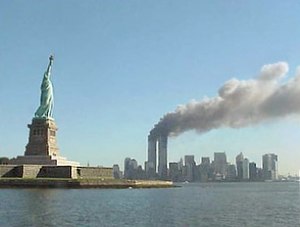Today, is a significant day. It's the 8th anniversary of horrific bombings and catastrophic airstrikes into t he Twin Towers.
he Twin Towers.
Sad but true, the world has indeed changed in these 8 years.
America's reaction, or as some may say over-reaction, post 9/11 has resulted in America's popularity plummeting the world over, except for a handful of countries.
Was Bush wrong? I really don't think he had a choice. He had to act, act really fast. The war in Afghanistan was largely justified, though I did have reservations on Iraq. Afghanistan was a global nuisance, but Iraq was a fairly safe and secular state under Saddam (though he wasn't quite a saint either).
America's plunging popularity has been evident in Pew Research Center's Pew Global Attitudes Project. America's "Favourability Rating" as Pew calls it has gone down considerably from 2000 to 2009. It is obvious that the decline would be substantial in the Islamic world, the Pew report confirms that. But what is surprising is the decline in the likes of Canada and Britain.
Something surely went wrong.
But on the other hand, America's popularity in India gives us some clues, some learning's. America has seen a steady but increasing popularity here.
The lesson is obvious. It is an issue of brute force vs. soft power.
The Islamic world thinks that it has been at the "receiving end" for long now. American allies like Canada and Britain which had supported the American brute force saw their economy falter. Their people saw their governments fighting America's war, under coercion etc. etc. which led to the decline in popularity.
On the other hand, in India, America exercised a kind of soft power. The American dream is something that India understands very well because we ourselves share similar dreams and aspirations. Outsourcing from America, H1B, etc. gave the Indian dream its wings. Hollywood has made significant inroads in India, not only through cable and satellite, but also through piracy - it is not uncommon to find peddlers selling Hollywood releases all over the country for a mere Rs. 50 - 100. Piracy in software also contributed to the growth and enhancement of IT skills in India - tell which small town computer institute here doesn't use pirated software? This in turn, opened a whole new world of economic possibilities. It may sound trivial, but American brands like Coke, Pepsi, McDonald's, etc. were the best ambassadors of America's soft power here.
America's soft power worked in India. Pew's numbers show that.
And that is a lesson for America. Influencing the world through soft power doesn't make enemies , brute force does, creating a spiral of war and destruction, as we have seen. Soft power, on the other hand, can prevent a 9/11-like situation.
Obama is perhaps trying to reorient the brute force into soft power. But I fear, he might swing to the other end of the spectrum and become completely soft and pliable. Closure of Guantanamo is one such example, which was covered in my earlier blog, Old Wine, New Bottle...
So time will tell whether America learns its lessons or not.....

2 comments:
What happened eight years back was very sad and tragic. U.S became tough and strict with travellers going there to scrutinise them at the ports of entry, and thus able to curtail further problems. India has to adopt similar attitude to control the terrorism. Nobody should be an exception, not even the VIPs or VVIPs. Let it be made clear to one and all. Security and safety of nation is a top priority.
US has to learn a lot to curtail terrorism effectively. Equipping Pakistan with arms and ammunition and providing huge economic assistance, and the same being misdirected to cause mayhem and destruction in different countries including India by the religious fanatics is to be borne in mind very seriously.
Post a Comment